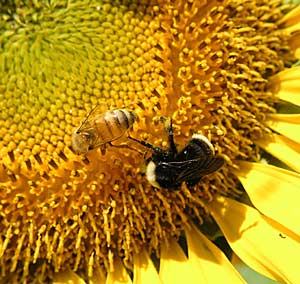Pollinators in the Spotlight
 A committee convened by the National Research Council has just issued a report on the Status of Pollinators in North America. The report is making news (see Washington Post story) because it concludes that populations of both "managed pollinators" (the honey bee) and some wild pollinators (native bees, butterflies, bats, and hummingbirds) are declining.
A committee convened by the National Research Council has just issued a report on the Status of Pollinators in North America. The report is making news (see Washington Post story) because it concludes that populations of both "managed pollinators" (the honey bee) and some wild pollinators (native bees, butterflies, bats, and hummingbirds) are declining.The pollinator story illustrates the practical challenges of responding to loss of ecosystem services, even when doing so makes economic sense. Ecosystem services will only be protected if they are recognized, threats to them are understood, and the people responsible for those threats see altering their behavior as both desirable and possible. The consequences of managed pollinator decline are fairly obvious -- the costs to farmers of honeybee rental have gone up. Yet there is little interest in moving to alternative managed pollinators or making better use of wild pollinators, in part because those pollinators are simply unfamiliar.
The impact of wild pollinator declines is harder to measure. Some wild bees appear to provide silent ecosystem services, enhancing the yield of crops that are generally considered self-pollinating. Greenleaf & Kremen, Biological Conservation 133:81-87 (2006), report that visits by wild bees increased the yield of field-grown tomatoes, and note that the presence of bees depends directly on the proximity of the field to natural habitat. Other pollinators are important to the survival of native plants, but most of those relationships are poorly understood.
The NRC committee recommends (among other things) that the Natural Resources Conservation Service (and presumably state and county extension offices as well) should educate farmers in pollinator-friendly practices, and that pollinator habitat protection should be incorporated into the USDA's conservation incentive programs. For that to work, as the committee notes, NRCS and USDA will need to build their expertise in ecology.
Photo credit: Sarah Greenleaf.












0 Comments:
Post a Comment
<< Home